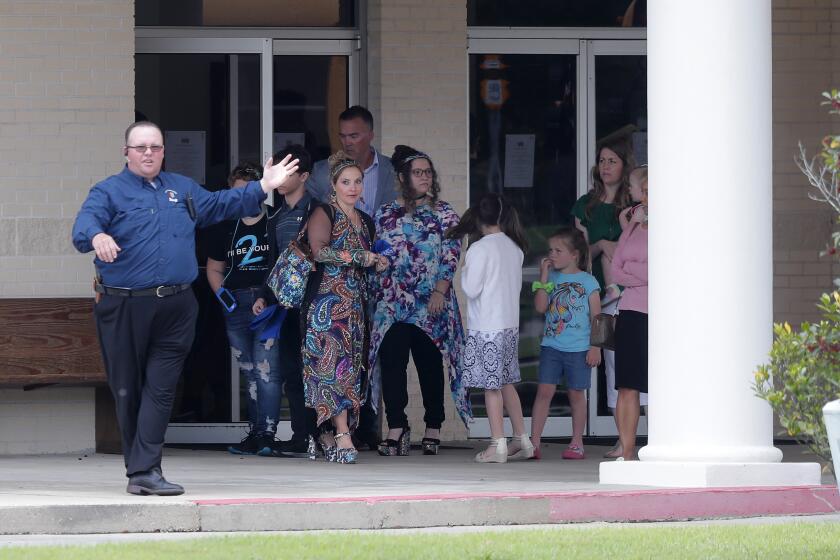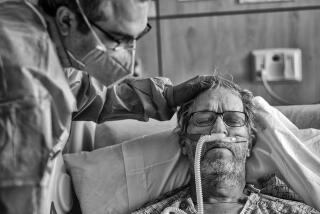Over Lent, this Beverly Hills priest battled coronavirus: ‘I didn’t know what plans Jesus had for me’
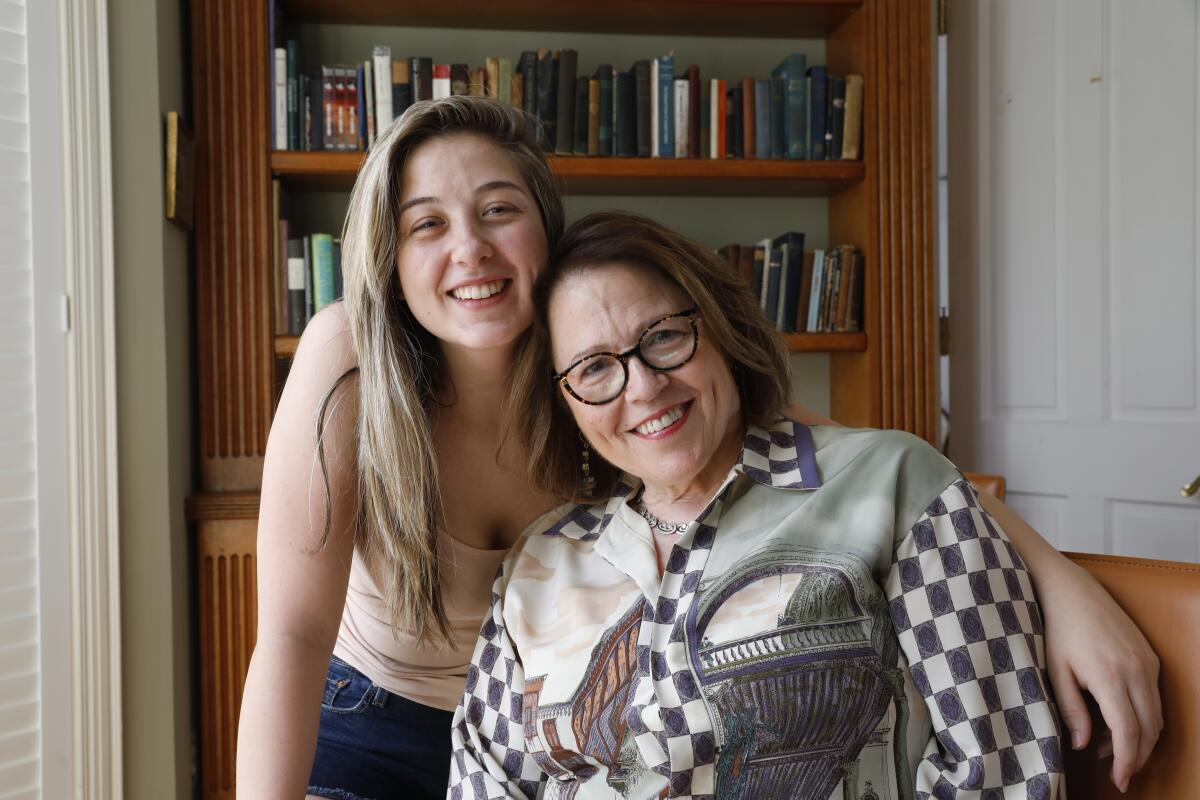
- Share via
Janet Broderick felt fine for the first few days after she returned from a religious conference in Kentucky in February. The 64-year-old rector of All Saints’ Episcopal Church put on her flowing green robe and held Sunday services.
She handed out Communion wafers. She baptized a baby. She went for a bike ride. She led the monthly meeting of church leaders.
She had arrived at the Beverly Hills church last summer and was busy preparing for her first Lent there — the season of reflection and repentance that starts with Ash Wednesday and culminates in Easter Sunday.
By Ash Wednesday, however, about a week after her return from Kentucky, she felt too sick to participate — the first time she had missed the service in 30 years as a priest. She thought she had the flu: body aches, exhaustion, a low-grade fever and a swollen neck that fit uncomfortably tight in her clerical collar.
At an urgent care clinic, a doctor diagnosed it as a “viral syndrome” and told her to rest, stay hydrated and take Ibuprofen. “Nobody suggested corona,” she said, referring to the coronavirus. She missed service that Sunday and the Sunday after that, the same day she learned that a man who had attended the Kentucky conference — a Georgetown pastor — had been diagnosed with COVID-19.
“I had never in my life felt like this,” Broderick said. “I thought, ‘Some doctor has to realize something happened. I’ve got to get help.’”
On Monday, March 9, she called her cardiologist, who urged her to go to the emergency room at Cedars-Sinai Medical Center, where medical personnel were waiting for her that morning. “The minute I got there, they put a mask on me,” she said.
She became sicker as the day went on. She had a bad cough, her fever surpassed 102, and it grew harder and harder to breathe. Her headache began at the crown of her head and throbbed down to her eyebrows.
They did a chest scan and put her in the intensive care unit, where that night she seriously considered the possibility that she might die. She mentally planned her funeral service, even picking the music, an 18th century hymn called “Come Thou Fount of Every Blessing.”
She tried to comfort her two adult children, Hannah and James, on a video call, but they later told her she reminded them of Darth Vader, so labored was her breathing. It would be days before she received confirmation that it was COVID-19, among the first confirmed cases in Los Angeles County.
From her bed she traded texts with her worried brother, actor Matthew Broderick, whom she had married to actress Sarah Jessica Parker.
And she texted her sister, Martha, a 69-year-old New York City psychoanalyst, to tell her she loved her. “I know I don’t say that enough,” she wrote.
Her sister, reassured that she was getting good care and was not ill enough to require a ventilator, replied: “You are not going to die!!”
‘A free spirit’
Janet Broderick is from a show-business family, not a conspicuously religious one. She grew up in New York’s Greenwich Village, her father an actor, her mother a playwright and painter.
“My outlook was very progressive, politically and artistically,” Broderick said. “I was raised in a family that was completely open to gay and lesbian people and was completely accepting of all sorts of folks.”
She graduated from the University of Michigan with a degree in history and math, and opened a pottery shop in the East Village. “I couldn’t really find a safe place in Christianity until I found the Episcopal Church,” she said.
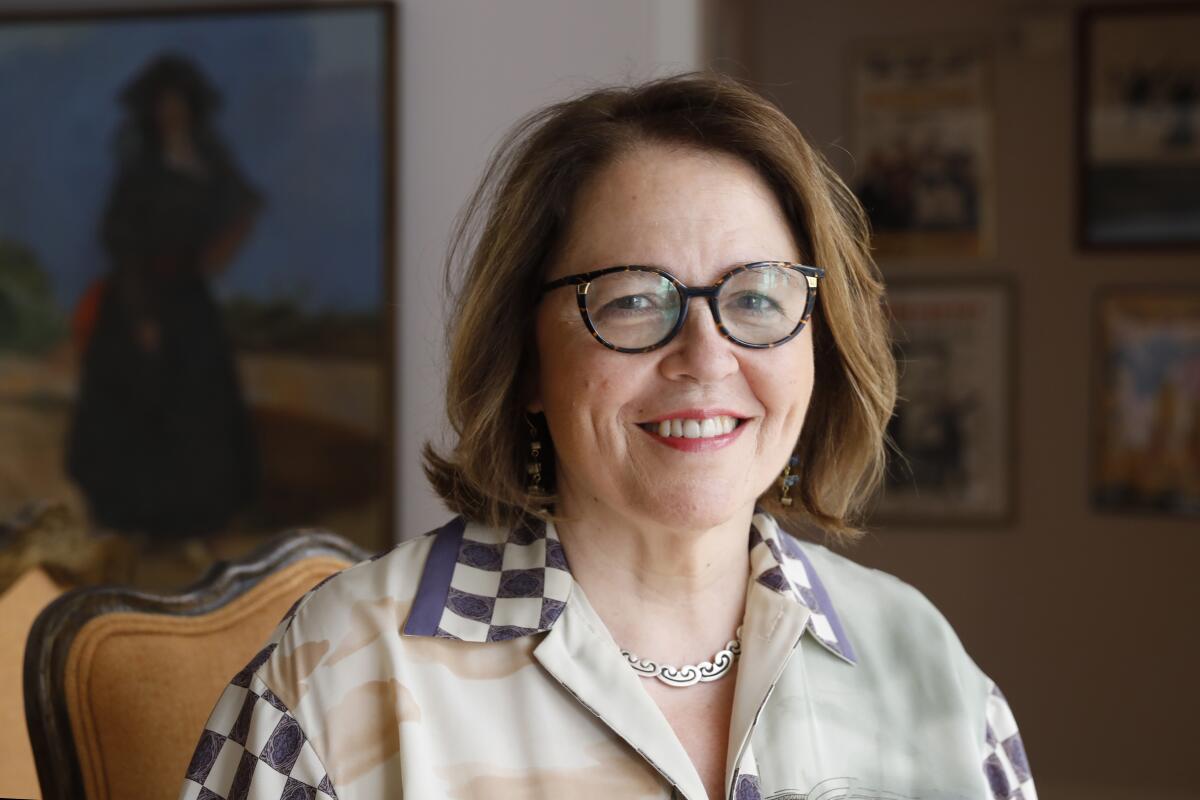
In the late 1970s, she walked into an Episcopal church in Manhattan wearing blue jeans and red Converse All Stars. The priest, Jim Munroe, became a friend and mentor, the person who “sort of taught me Christianity” and gave counsel during rough periods, as when she divorced the father of her two children.
“She wanted to go beneath moralism to something deeper, to sacrificial love,” said Munroe, now 73 and retired. “That attracted me to her right away. She also was and is a free spirit.”
She said her parents were puzzled by the intensity of her religious devotion. “They wanted me to be happy, but I don’t think they totally understood it. I think they would have preferred that I stayed being a potter,” she said.
She was in her 20s when her father, James Broderick, who had starred in “Dog Day Afternoon” and the TV series “Family,” fell ill with cancer. She told a friend, “I can’t possibly believe in God anymore because of what’s happened,” Broderick recalled. “Or if there’s a God I don’t want anything to do with him anyway.” Her friend replied: “It’s like the Atlantic Ocean. You don’t have to believe in it — there is an ocean.”
Her father died in 1982. He was 55.
“She found her spirituality in a very intense way at that point,” said her sister, Martha. “I went in the other direction. I thought, ‘If any higher power orchestrated this, I was not particularly interested.’ … We evolved in different ways, but with respect for each other.”
Janet Broderick was ordained in 1990. At the ceremony at the Cathedral Church of St. John the Divine in New York City, her brother read a passage from the Old Testament.
“When I first came in the church, it was not so easy to be a woman priest,” she said. “I was constantly having to answer the question, ‘Why are you doing this as a woman?’”
Broderick spent years running parishes in New Jersey, first in Jersey City and then in Morristown, where she helped launch an after-school program for children in the U.S. illegally. She frequently used clips from TV, film and literature — from episodes of “The Twilight Zone” and “Gunsmoke” to James Joyce’s “Ulysses” — to illustrate scriptural messages.
All Saints’ in Beverly Hills was one of the first large Episcopal churches with a female rector. Broderick became the second when she arrived at the church last summer.
More from Christopher Goffard
The church, with about 800 parishioners, draws people from Beverly Hills and surrounding cities, many of whom work in the entertainment industry, many from the LGBTQ community. On a given Sunday, she preaches to about 350 people over three services.
“Some of our folks were rejected by conservative congregations because they were gay or lesbian or maybe freer thinkers,” Broderick said.
Chris Cook, a 59-year-old church warden, said he and his husband were the first same-sex couple to be married at All Saints’. He had long been wary of organized religion, he said, because “all I heard from the far right was how I was going to burn in hell.”
He said he found All Saints’ in the mid-2000s after a nearby Presbyterian church told him he’d find a more welcoming environment there. “She’s East Coast,” he said of Broderick. “She’s got a directness. She’s got a theatrical style.”
Cook said Broderick’s hospitalization “personalized All Saints’ experience with coronavirus,” adding: “We’ve moved into a stronger, more connected community because of this strange gift.” He said the church has launched a phone tree of nearly 50 callers, so all of the parishioners can be reached.
“We have this giant pyramid we’re preparing for what is going to hit us in the next few weeks,” Cook said. “This coronavirus landed on our front steps and it made our knees knock…. It just scared everybody.”
A terrifying ordeal
Broderick, an avid bicyclist and an enthusiast of pilates and yoga, did not have underlying health conditions such as asthma that increased her risk of severe illness from COVID-19. She said it was in part her rapid deterioration March 9 that convinced doctors she had the virus, even before the results were in. Doctors gave her antiviral medicine and put her on oxygen.
“I thought, ‘Jesus is here — it could go either way,’” she said. “I didn’t know what plans Jesus had for me, but I knew we were going to do this together. I knew it was very important not to be afraid. I said, ‘Where I am going, I am going with Jesus.’ … I thought, ‘I’m not gonna fight it. Stay on purpose and don’t fight it. If I start getting anxious, it’s just gonna speed up my breathing.’”
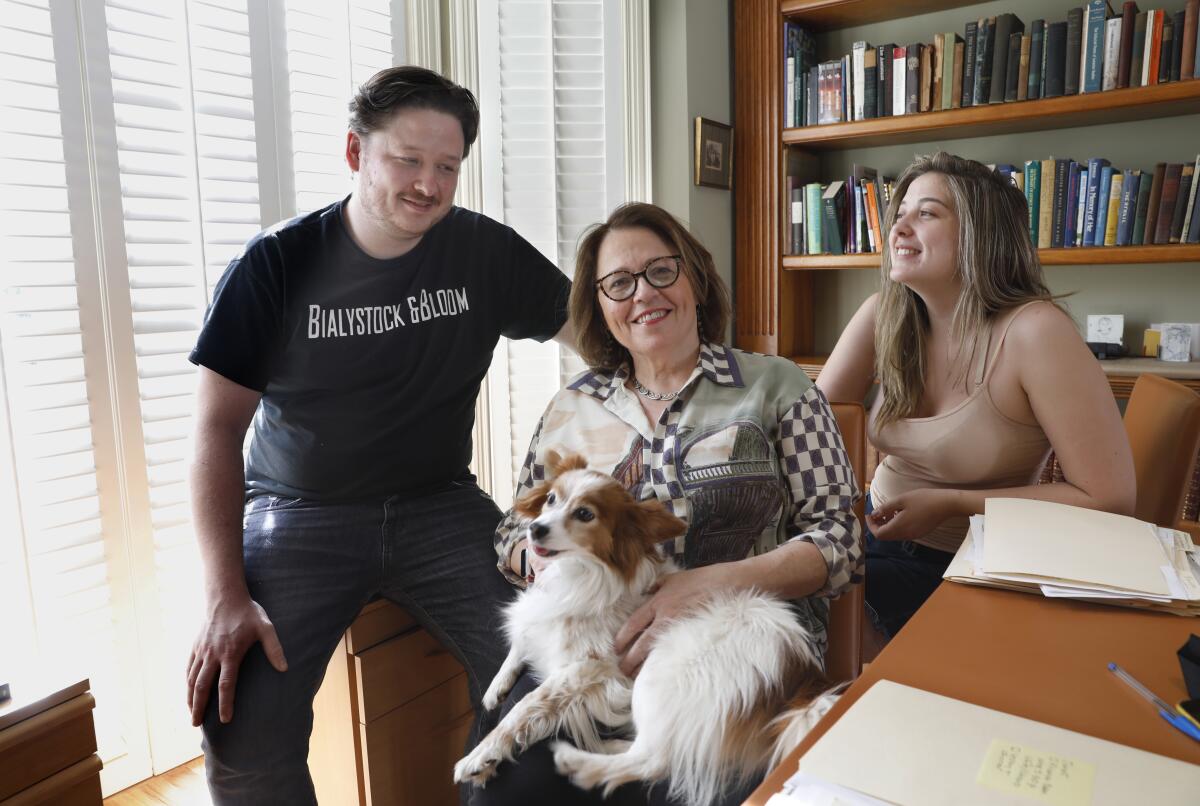
She decided she wanted Munroe to speak at her memorial service, if it came to that. “I wanted my children to be OK,” she said. “I knew that he would preach God’s love, and he’d comfort my children.”
As she lay in the ICU, she said, hospital workers were hesitant to change her sheets.
“I said, ‘Can I get some sheets?’ Finally an assistant said, ‘You know why this isn’t happening? People are scared of you. They’re scared. They don’t want to get sick.’”
The health department called with questions: Who had she been in contact with in recent days?
Broderick was worried about having infected the people of her church, but she was too ill to accurately reconstruct her movements. She asked her church staff to study her calendar, and to begin the difficult task of calling everyone who might have been exposed to her in recent days.
Cook made a lot of the calls. He said 90% of the people “were loving and gracious and worried about her, and a little scared for themselves,” Cook said. “A couple people were really angry.”
Broderick said one parishioner tested positive for COVID-19 but did not require hospitalization. She said the man had stopped by her house for some paperwork, but she had not touched him or offered him anything to drink or eat.
By the evening of March 10, Broderick said, “I knew that I was extremely weak but I wasn’t dying anymore.”
“It was a very terrifying time for my church,” she said, reflecting on the experience from her home near the church. “Can you imagine what it was like to be in my congregation to find out maybe your priest endangered your life?”
The theology and politics of some churches pushes them to keep holding services — in some cases, risking public health and arrest.
She was in the hospital for about a week and is back home now, mostly recovered, in the company of her children. She plays the board game “Settlers of Catan” with them, and Zooms with her vestry.
Like many churches, All Saints’ is holding services remotely. She doesn’t know when the doors will reopen, but she is preparing an online message for Palm Sunday. The day commemorates Jesus’ entry into Jerusalem, where townspeople waved palms in reverence. By day’s end, he knew he would be crucified.
“That’s a scary story,” she said, adding: “I can’t help but think of people who are on respirators and the people who are dying. This is not a happy ending for a lot of people.”
More to Read
Sign up for Essential California
The most important California stories and recommendations in your inbox every morning.
You may occasionally receive promotional content from the Los Angeles Times.
